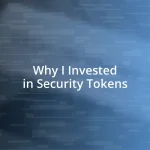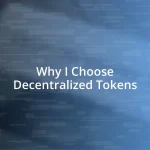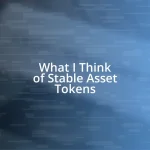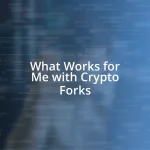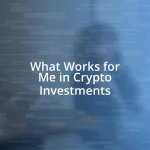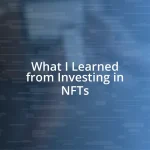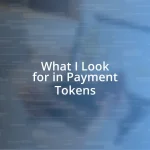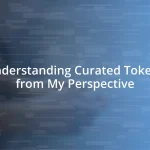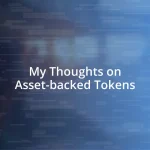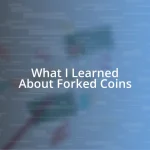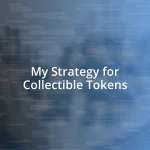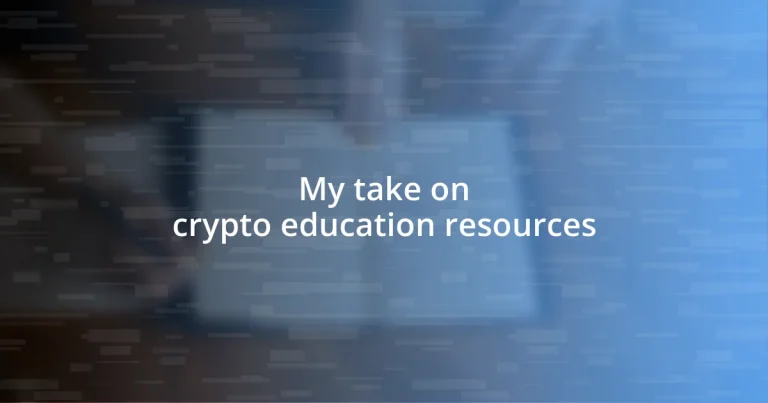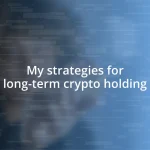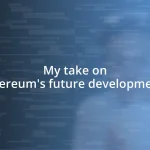Key takeaways:
- Access to credible crypto education resources fosters confidence and informed decision-making, helping individuals navigate the complex landscape of cryptocurrency.
- Engagement with credible professionals and communities enhances learning, providing diverse perspectives and fostering motivation in the crypto space.
- Practical strategies, such as interactive courses, maintaining a crypto journal, and setting realistic learning goals, significantly improve the crypto education experience.
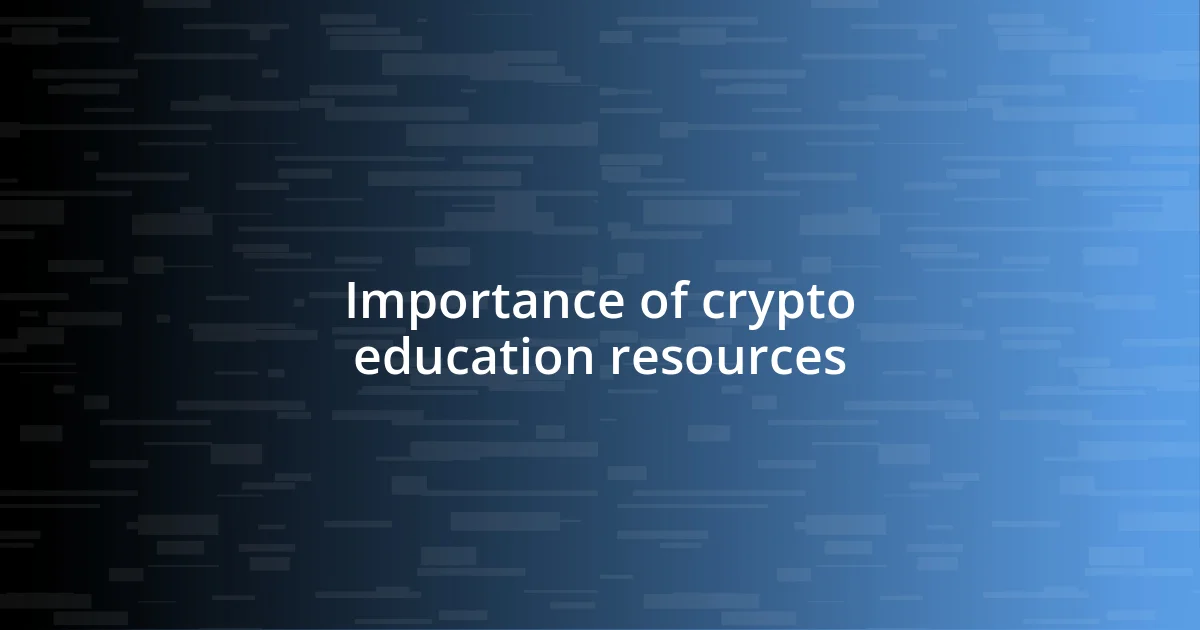
Importance of crypto education resources
Understanding crypto-related concepts is crucial for anyone looking to navigate this rapidly evolving landscape. I remember the first time I stumbled upon Bitcoin. It seemed so overwhelming! Without the right education resources, I could have easily dismissed it as a passing trend. Having access to informative materials can make all the difference in fostering confidence and informed decision-making.
The world of cryptocurrency can be murky, full of jargon and complex ideas. For instance, when I first learned about blockchain technology, it felt like learning a new language. But through dedicated resources, everything eventually clicked. Relying on trustworthy educational platforms allowed me to grasp important concepts that directly impact my investments and took away some of that initial anxiety.
Imagine you’re at a bustling market where everyone is talking about the latest crypto trends, but you can’t understand the language. How would that feel? This is where quality education resources shine; they empower individuals to join the conversation and make informed choices. It’s reassuring to know that with the right knowledge, we’re better equipped to face the challenges and opportunities in the crypto world.
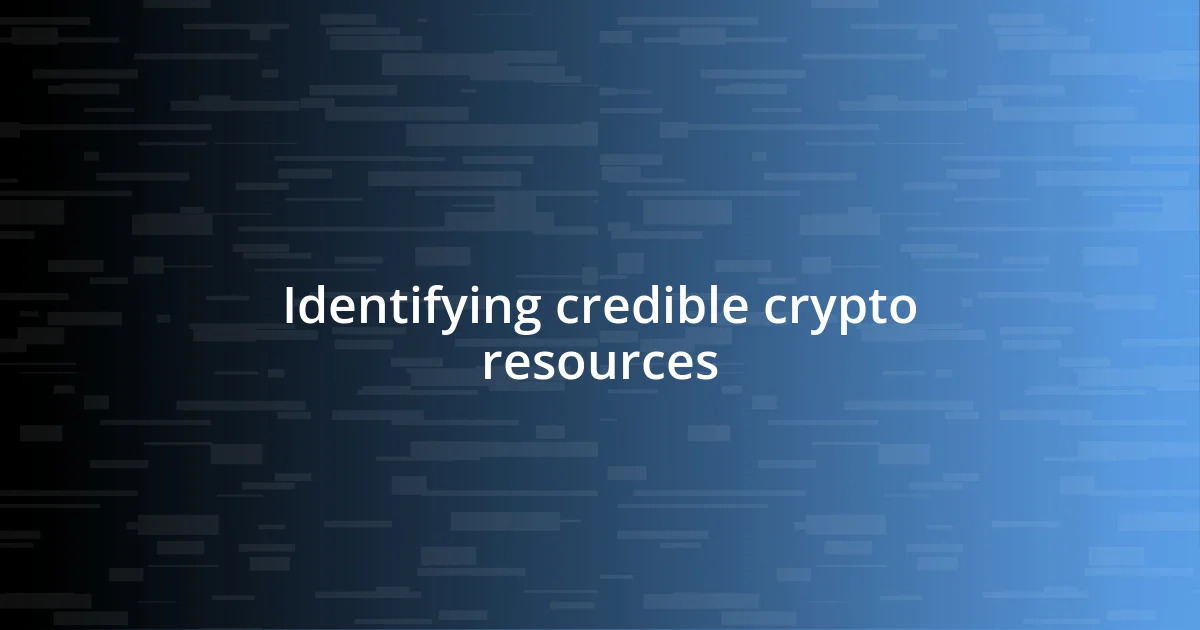
Identifying credible crypto resources
When it comes to finding credible crypto resources, I believe that the source’s reliability is paramount. Personally, I’ve learned to trust resources that are backed by industry experts or reputable organizations. For instance, I often turn to educational platforms associated with well-known universities or established financial institutions. These sources not only provide factual information but also offer in-depth insights that have helped me build a solid foundation in understanding cryptocurrencies.
I recall a time when I stumbled upon forums filled with mixed opinions and inaccurate information. It was a chaotic experience, to say the least. After some careful research, I realized that networking sites like LinkedIn are invaluable for connecting with credible professionals in the field. Engaging with experienced individuals, who provide clarity on real-world crypto applications, helped dispel many misconceptions I initially had. This direct interaction made a significant difference in my learning journey.
To further expand on recognizing trustworthy resources, I’ve created a comparison of various types available in the market. This is something I wish I had when I started my crypto education; it encapsulates my journey of trial and error.
| Type of Resource | Credibility Indicators |
|---|---|
| Online Courses | Accredited providers, industry-recognized certifications |
| Podcasts | Expert guests, reputable hosting platforms |
| Books | Authors with experience in finance or crypto, positive reviews |
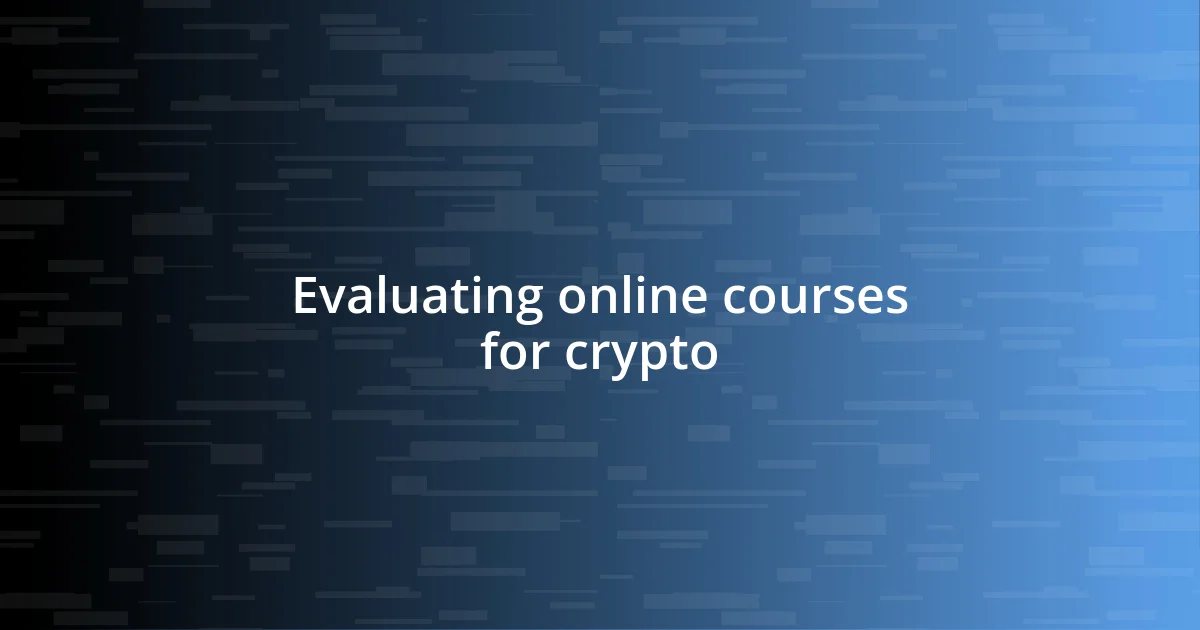
Evaluating online courses for crypto
When evaluating online courses for crypto, I always look for a few essential elements that can make or break the learning experience. I’ve taken courses that, despite a flashy presentation, provided little more than surface-level information. It’s frustrating to invest time and money into a program that doesn’t deepen my understanding. What truly helps is finding courses that include real-world case studies, interactive components, and expert-led sessions. These elements not only keep me engaged but also allow me to apply what I’ve learned.
Here are some features I consider vital when exploring online crypto courses:
- Course Content: In-depth modules that cover everything from basic concepts to advanced topics.
- Instructor Credentials: Knowledgeable teachers with practical experience in blockchain and cryptocurrency.
- User Reviews: Feedback from other learners, which often reveals both the strengths and weaknesses of the course.
- Ongoing Support: Access to forums, Q&A sessions, or mentorship helps solidify the learning process.
- Certification: Recognizable qualifications that demonstrate the course’s credibility and may enhance career prospects.
Diving deeper into these aspects has made my crypto journey far more rewarding. I recall taking a course where the instructor not only explained concepts but shared personal anecdotes from the industry. It made complex ideas feel relatable and, frankly, gave me a sense of hope that I, too, could navigate the crypto market successfully. Each of these factors collectively contributes to a well-rounded educational experience that ultimately empowers learners to make informed decisions.
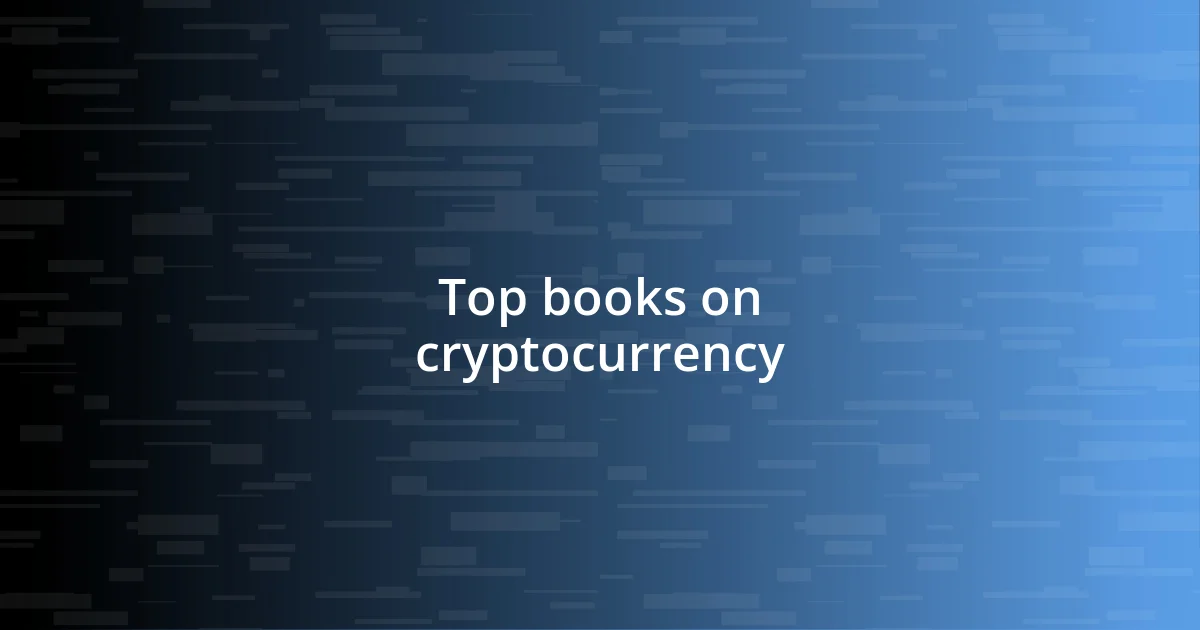
Top books on cryptocurrency
One standout book that I often recommend is “The Basics of Bitcoins and Blockchains” by Antony Lewis. What I appreciate about this book is its simplicity—it breaks down complex subjects into digestible pieces. I remember sitting on my porch, gradually flipping through the pages and realizing how much I didn’t know before diving into this read. It’s like having a knowledgeable friend explain Bitcoin and blockchain without overwhelming jargon.
Another gem is “Mastering Bitcoin” by Andreas M. Antonopoulos. This book dives deep into the technical foundations of Bitcoin, and I can’t stress enough how it transformed my understanding. There were moments when I found myself re-reading sections, completely fascinated by how cryptography plays a crucial role in securing transactions. It was an “aha!” moment that inspired me to explore further into the world of technology behind cryptocurrencies.
Lastly, I must mention “Cryptoassets” by Chris Burniske and Jack Tatar. Their approach to evaluating cryptocurrencies from an investment perspective has profoundly impacted my own investment strategies. I remember analyzing my portfolio while referencing their insights and realizing the importance of a structured, research-based approach. This book isn’t just for investors; it’s for anyone curious about the financial potential of cryptoassets. What more could you ask for than guidance from seasoned experts who have walked the walk?
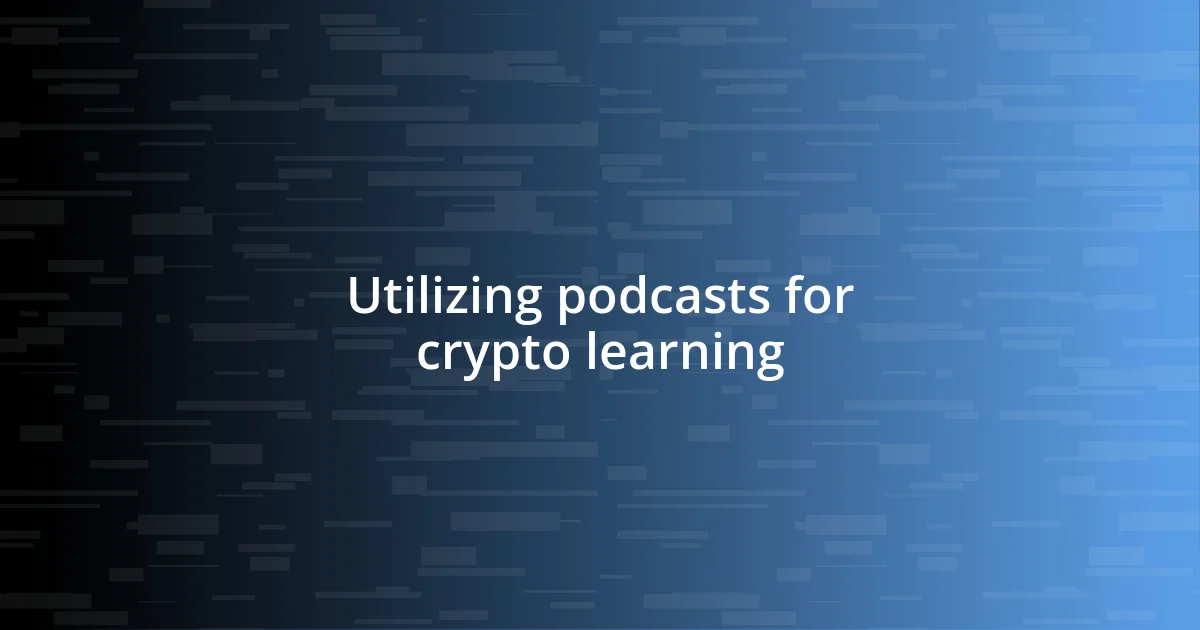
Utilizing podcasts for crypto learning
Podcasts have become a powerhouse for crypto education in my learning journey. I vividly remember walking my dog while tuning into a podcast episode that literally changed the way I viewed market dynamics. The hosts broke down complex economic theories in a conversational style, making it easier for someone like me, with a non-technical background, to follow. It felt like having a casual discussion with knowledgeable friends, where every episode left me with something new and exciting to ponder.
What I find particularly valuable about podcasts is their accessibility. Imagine being able to learn about the latest crypto trends while doing the dishes or during a morning commute. I can’t count the number of times I’ve paused an episode to jot down notes or ideas sparked by a guest’s insights. These informal learning settings foster a relaxed environment, allowing me to absorb information without the pressure of formal education.
Another important aspect is the diverse perspectives podcasts offer. I remember listening to an interview with a blockchain developer who shared their struggles and victories in the industry. It opened my eyes to the human side of crypto, highlighting that behind every tech innovation, there are passionate individuals. This kind of storytelling isn’t just informative; it personally resonates, making the entire learning experience feel relatable and inspiring. Have you ever felt a connection with someone’s story that prompted you to dive deeper into a subject? That’s the magic of podcasting for crypto education.
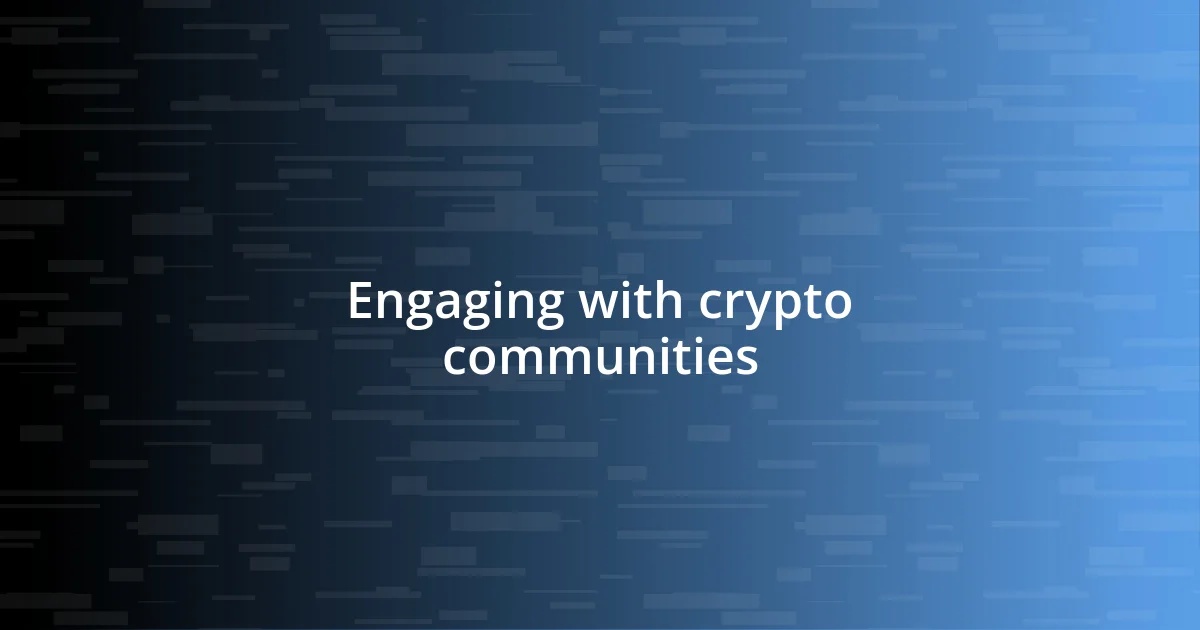
Engaging with crypto communities
Engaging with crypto communities can significantly enhance your understanding of this dynamic field. I recall joining an online forum where enthusiasts shared their insights and experiences. It was a game-changer for me. The sense of belonging fueled my motivation to learn more. It’s fascinating how connecting with others who share your interests can ignite a spark of curiosity and drive. Have you ever found yourself diving deeper into a topic just by being in the right company?
I’ve also had remarkable experiences at local meetups where everyone was eager to share their knowledge and opinions. One evening, I participated in a discussion about the future of decentralized finance, and I left feeling not only educated but excited about the possibilities. The informal setting allowed for passionate exchanges that textbooks simply can’t replicate. Isn’t it amazing how the energy in a room full of like-minded individuals can propel your learning journey forward?
Moreover, social media platforms like Twitter and Discord have given rise to vibrant crypto communities. I remember stumbling across a Twitter thread that unraveled the latest NFT trends. The insights were so refreshing and thought-provoking that I ended up engaging with multiple users, each offering their own unique perspectives. It felt like a continuous learning cycle where ideas flowed freely, expanding my understanding beyond what I had previously known. Have you tapped into these digital spaces to broaden your knowledge? They’ve certainly enriched my experience!
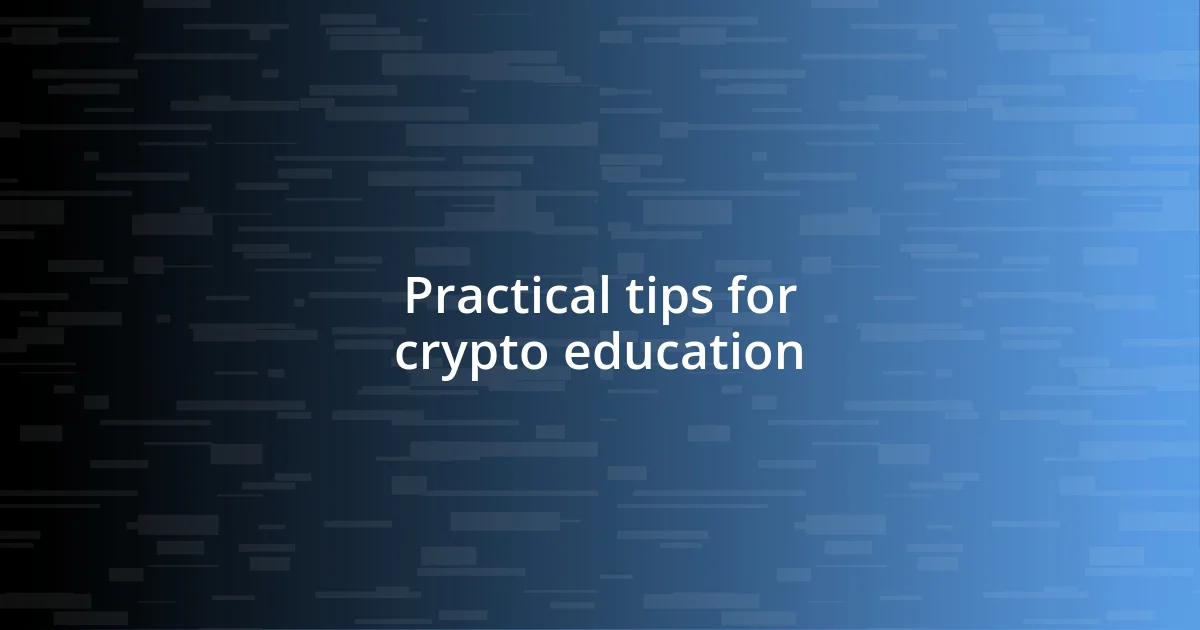
Practical tips for crypto education
Exploring interactive online courses has been a breakthrough for me in crypto education. I recall when I first discovered a platform that tailored lessons to my specific knowledge level. The combination of quizzes and engaging video lectures made complex concepts approachable without feeling overwhelming. Have you ever found a course that just clicked for you? I remember the satisfaction of finally grasping blockchain technology after an instructor’s clear, step-by-step breakdown, which felt like unlocking a hidden treasure.
Additionally, keeping a crypto journal has proven invaluable. I started noting my own investment thoughts and tracking market developments. Looking back through those entries, I can see how my mindset evolved. This practice not only solidified what I learned but also revealed patterns in my thinking, which is essential in such a volatile field. Do you ever take the time to reflect on your learning journey? This simple habit has transformed my understanding and made my learning more personal.
Finally, I can’t stress enough the value of setting realistic goals in your crypto education. When I first started, I aimed too high, trying to absorb everything at once. It felt daunting and soon led to frustration. I later adopted a more gradual approach, focusing on one topic at a time, like understanding cryptocurrencies before diving into trading strategies. This method cleared the overwhelm and made each lesson feel like a success. How do you typically set your learning objectives? For me, breaking it down has made the entire experience far more enjoyable and productive.
